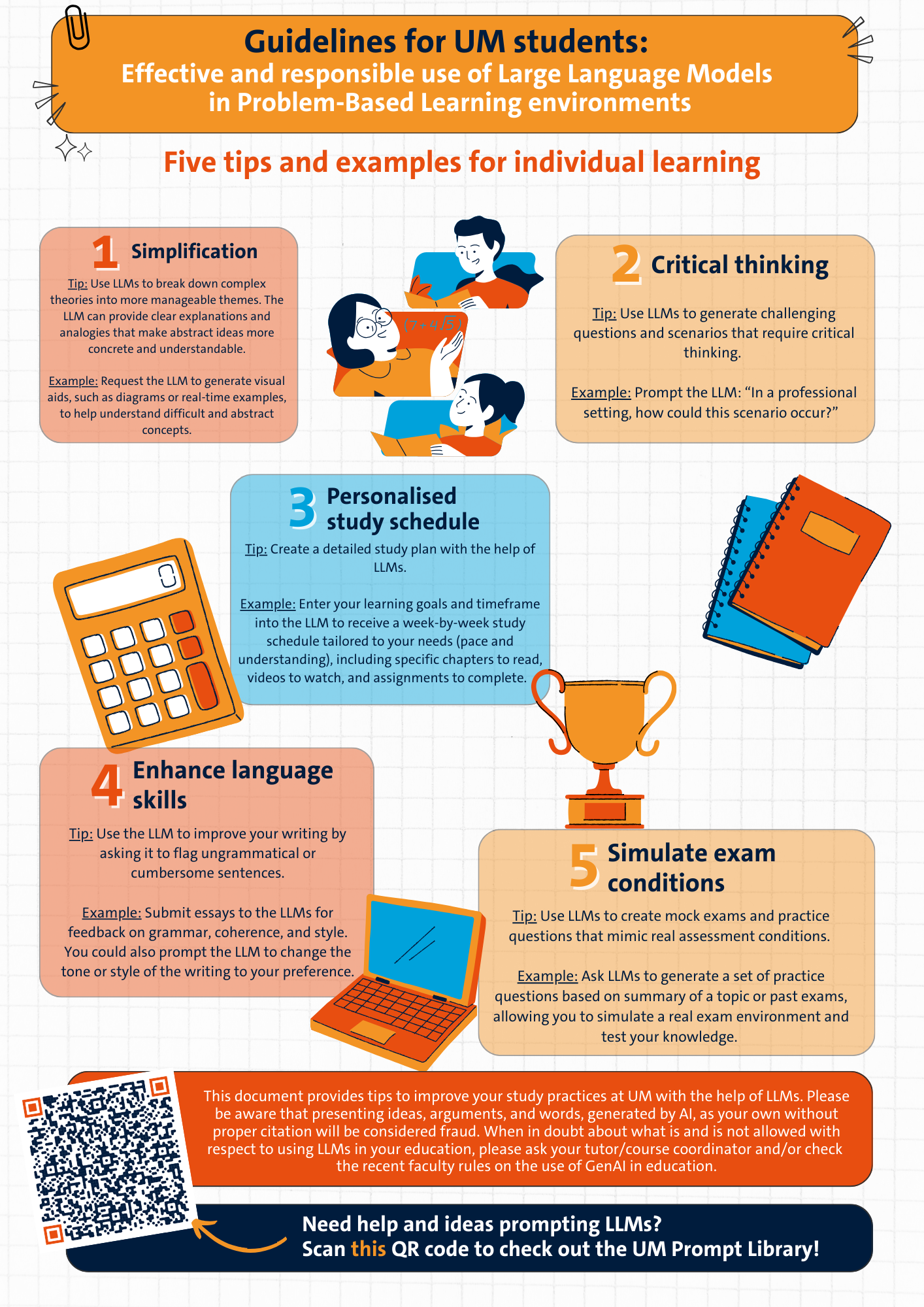We are told that Artificial Intelligence (AI) will change the world, but how will it change your world?
Karin van Leeuwen awarded NWO Open Competition SSH XS grant
€50,000 for the project ‘Judicialization and democracy: towards an historicized approach’.

Resources for students
- Track your AI usage learning activity with the help of this template.
- Download UM’s most recent student guidelines for learning with LLMs
Guidelines for learning with LLMs

Resources
- Maastricht University Policy Framework on Generative AI
GenAI and PBL documents
Navigating the role of Large Language Models
in Problem-Based Learning: A rapid review
- Student guidelines for effective LLM use at UM
- GenAI use table (created by FASoS)
- GenAI usage diary template
- Handbook GenAI and Scientific Writing: ILOs, TLAs, Assesment (FHML)
- AI Literacy ILOs (FHML)
- Faculty fact sheets
- School of Business and Economics
- Faculty of Arts and Social Sciences
- Faculty of Law
- Faculty of Science and Engineering
- Faculty of Health, Medicine and Life Sciences
Faculty of Psychology and Neuroscience
- GenAI Policy — Learning, Teaching and Assessment (FASoS)
- Policy Framework Proposal for Responsible and Ethical Use of Generative AI (UCM)
- Existing policy documents on the use of AI in education
- Universiteit Utrecht (2023) Richtlijnen generatieve AI
- Universiteit Leiden (2023), ChatGPT: Wat kan (en mag) er?
- Wageningen University (2023) (Generative) AI and Education: Information for Students
- Rijksuniversiteit Groningen (2023) Artificial Intelligence (AI) tools in education
- Rijksuniversiteit Groningen (2024) Basisregels AI in het onderwijs
- KU Leuven (2023), Verantwoord gebruik van Generatieve Artificiële Intelligentie
- NLAIC (2023), Advies generatieve AI-tools in het MBO, HBO en WO
- Policy documents on the use of AI in research
- LUMC (2023) LLMs in PhD dissertations
- UVA (2023) first explorations policy on generative AI in research (internal document)
- KU Leuven (2023), Using generative artificial intelligence as a researcher
- NWO (2024) Voorlopig NWO-standpunt over generatieve AI in het aanvraag- en beoordelingsproces
- Other relevant policy documents
- NLAIC (2023), Advies generatieve AI-tools in het MBO, HBO en WO
- Npuls (2023), Smarter education with AI
UNL werkgroep publieke waarden (2021), Advies publieke waarden voor het onderwijs
UNL werkgroep publieke waarden (2022), Seven Guiding Principles for Open Research Information
- SURF (2022), Promises of AI in Education: Discussing the impact of AI systems in educational practices
- Eimers, T. et al. (red.) (2023) Vandaag is het 2040. Toekomstverkenning voor middelbaar beroepsonderwijs, hoger onderwijs en wetenschap
- WRR (2021) Opgave AI. De nieuwe systeemtechnologie
- Institute for Information Law (2023). Information Law and the Digital Transformation of the University. Part I. Digital Sovereignty.
- Unesco (2022) Recommendation on the ethics of Artificial Intelligence
- Nature Series (2023) AI will transform science — now researchers must tame it
- Collective databases with resources
- Internal articles
- Are you talking to me? The rise of chatbots in education, by Sjoerd Stoffels, FASoS
- Let's get off the fear carousel!, by Alexandra Mihai
- I wrote all of this myself!!, by Jan Scholtes
- ChatGPT and studying – use it, don’t abuse it, an interview with Walter Jansen and Peter Vermeer, by Florian Raith
- ChatGPT, AI and the labour market: Nice, but will I lose my job? an interview with Jermain Kaminski and Mark Levels, by Florian Raith
- ChatGPT and Science, Technology and Society Studies: why ChatGPT has generated so much hype, an interview with Flora Lysen, Massimiliano Simons and Maximilian Roßmann, by Florian Raith
External articles:
- Publications
- Generative AI’s impact on critical thinking: revisiting Bloom’s taxonomy, Chahna Gonsalves (2024)
- Generative AI’s impact on critical thinking: revisiting Bloom’s taxonomy, Chahna Gonsalves (2024)
If you know of other internal articles or blog posts to be added to this list, please contact us!
